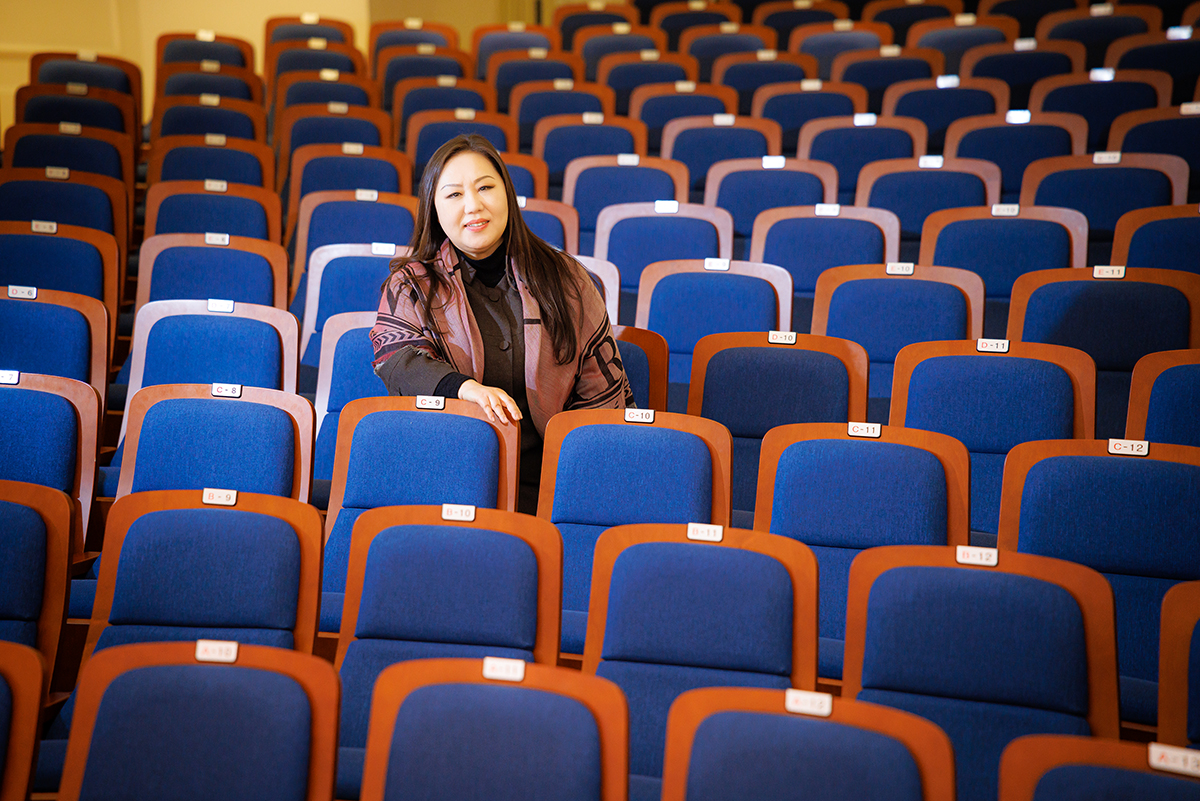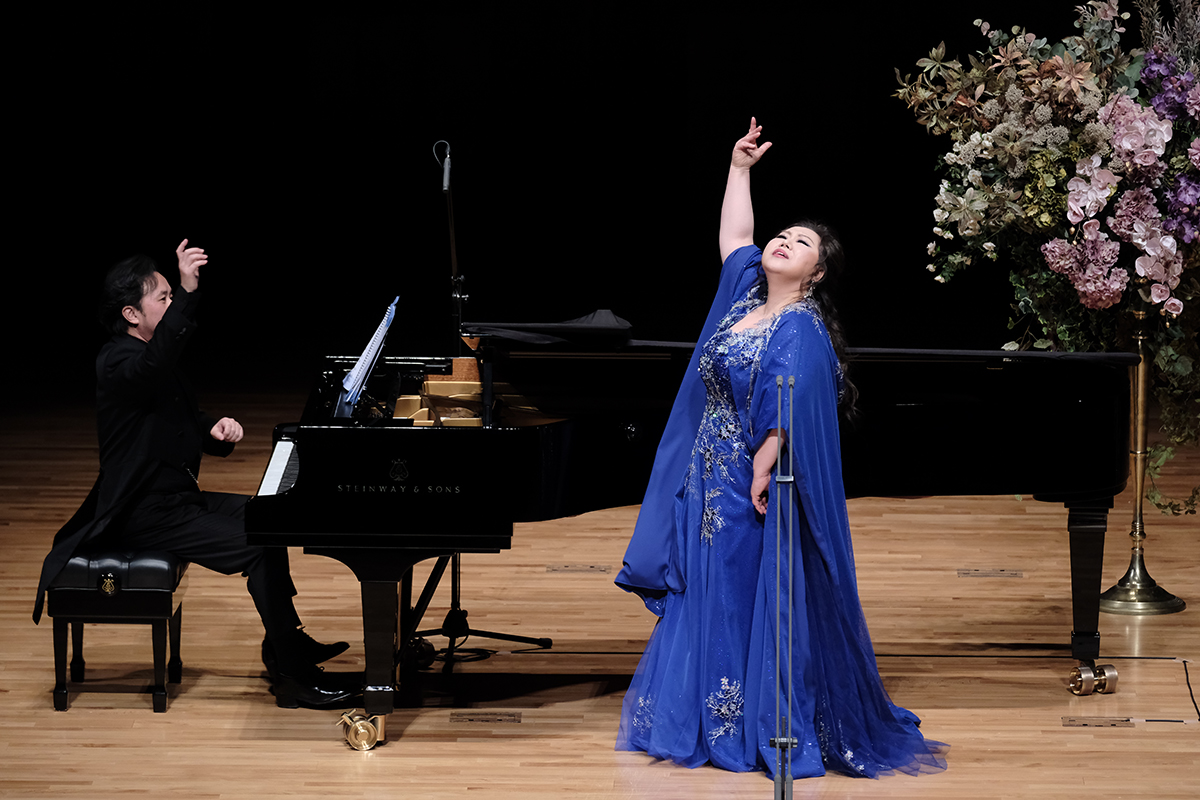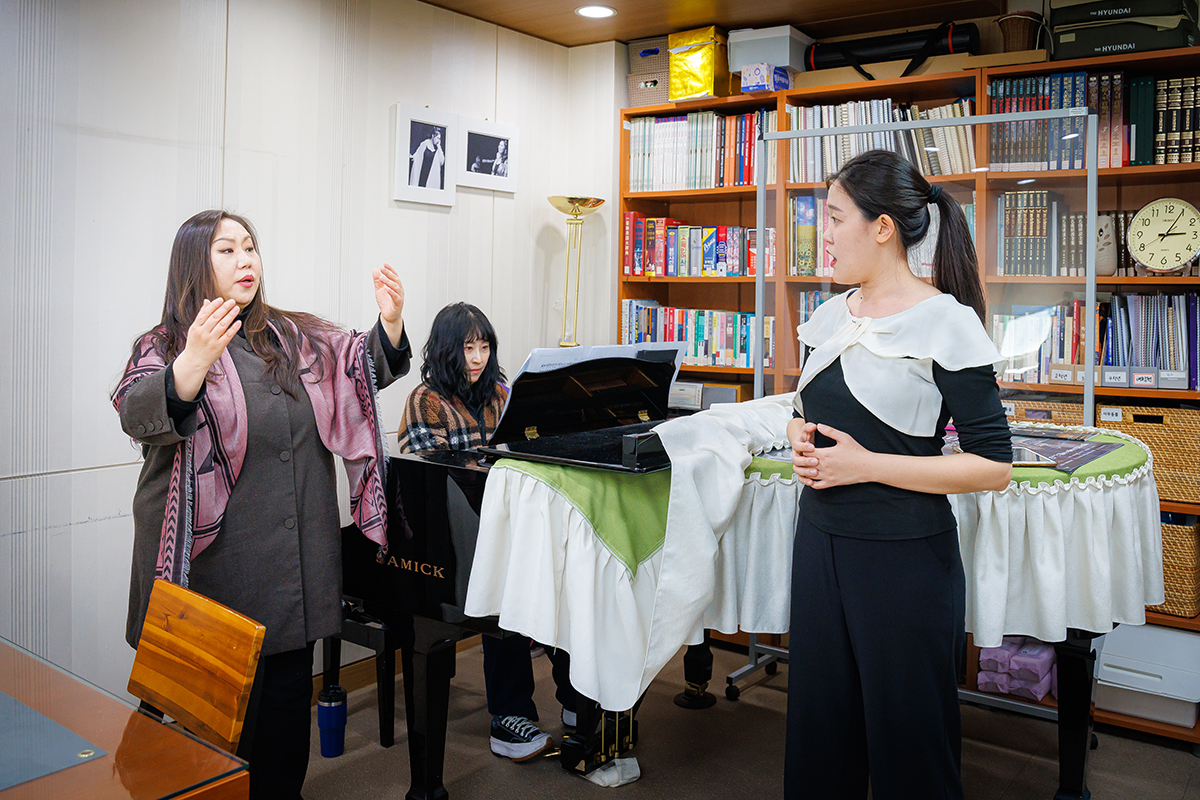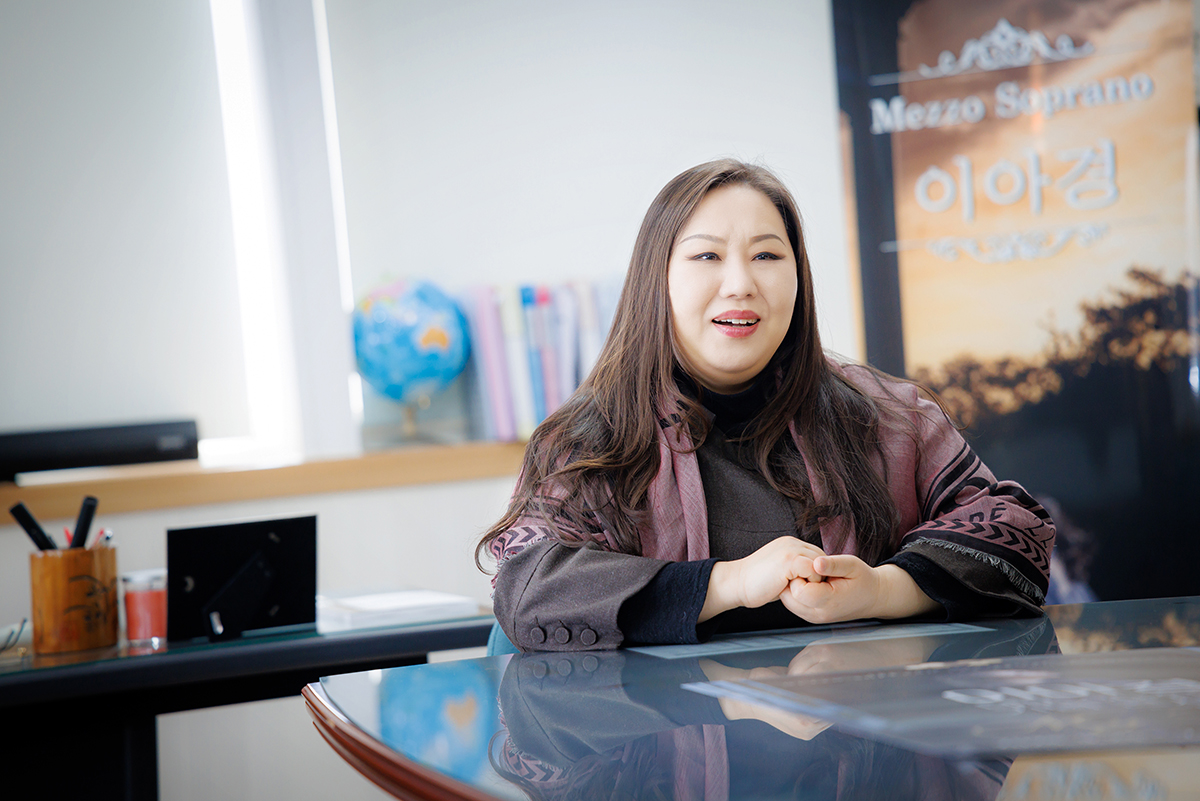News
Professor A Kyeong Lee, World-Renowned Mezzo-Soprano, Celebrates Her 30th Debut Anniversary with Commemorative Concert, My Way
2025-04-21 Academic

Professor A Kyeong Lee of the College of Music held a commemorative concert, My way, to celebrate the 30th anniversary of her debut
Professor A. Kyeong Lee of the College of Music commemorated the thirtieth anniversary of her debut with a concert titled My Way. In an interview preceding the performance, Professor Lee, who metaphorically regards life as a progression through the seasons, particularly the transition from summer to fall, shared her reflections on reaching this milestone. A girl who once dreamed of a life in public service, envisioning herself becoming either a nun or a nurse, she now captivates both audiences and students as a celebrated international vocalist and an accessible, dedicated professor. <Editor’s Note>

Q. What prompted you to pursue vocal music?
I never imagined majoring in vocal music. I spent more time considering studying German, nursing, or even becoming a nun. Though I studied piano, I preferred singing. During that time, at my teacher’s suggestion, I entered the Jinhae Gunhangje Festival and won second place in vocal music—before I had received any formal training. From there, I began singing in earnest and went on to win first or second place in various university competitions.
Debuted by chance, studied abroad in Italy a little later and won first place in six competitions
Q. You started singing after winning a competition and entered Kyung Hee. Let us hear the story of when you first joined the University.
In my senior year of high school, I visited Seoul to explore college campuses in search of one that suited my heart and aspirations. As I toured several universities, I was instantly drawn to the Seoul Campus of Kyung Hee University. The lush greenery left a lasting impression, and I found myself wanting to be a part of it. The presence of esteemed professors, such as Professor Jeong-heng Eom, also played a significant role in my decision.
I felt anxious during the entrance exam process. Most of the applicants I met were from famous arts high schools in Seoul, while I had been a humanities major and had come to vocal music relatively late. I sensed a difference between myself and the others. Even after being admitted, some senior students would question, “Why did you choose Kyung Hee when you could have gone elsewhere?” Their questions strengthened my resolve: “I will become someone who brings honor to the University through my name.” In my first year, I placed first in the practical exam. From that point on, I believed, “I can do it.” It wasn’t about striving for rank: it was the relief of knowing that, if I worked hard, I could succeed.
Q. You were also the top student when you graduated. When did you grow the most as a vocalist?
Although I was a top student, I lacked confidence in my singing until after I graduated from college. I never felt my vocal skills were truly polished. Because of that, I avoided competitions during my college years, convinced I wasn’t quite up to the level of excellence that would contribute to raising the University’s stature. While I was in graduate school, however, I sang with the Incheon City Choir. During an evaluation, Director Soo-gil Park of the National Opera Company was serving as a judge. He discovered me during that evaluation and offered me a debut role on the spot. That debut came in 1995, when I performed the lead in Gian Carlo Menotti’s The Medium with the National Opera Company.
At the time, many of my seniors encouraged me by saying, “You’re like a raw gemstone—you’ll grow even more if you study abroad.” So, in 2011, at the somewhat late age of thirty-one, I went to Italy to further my studies. Soon after arriving, I met a senior vocal coach in Parma. I had prepared a song, and after hearing me sing just once, he asked where I had studied and who my teacher was. When I told him I was born and raised in Korea and had studied under Professor Hoon Lee at Kyung Hee, he responded, “You speak Italian well—and you don’t have an Asian voice.”
The story of Coach Fulvio Bottega, with whom I still stay in touch and collaborate, remains especially memorable. After our sessions, he would encourage me with the words, “Go and win!”—and the following year, I did just that, winning first place in six international competitions. It felt like I had validated not only my studies in Italy, but also the foundation I had built back home in Korea. That period was, in many ways, my “summer”—a season of growth in my musical abilities and a time of anticipation, as I waited for the harvest of those efforts.
In 2004, I returned to Korea to perform in the National Opera Company’s production of Aida and made the decision to come home for good. Around that time, I had also received an exclusive offer from the Hamburg Theater in Germany. My European agent, aware of additional interest from several other theaters, tried to dissuade me. But I felt a deep desire to give back to the Korean stage, which had nurtured me before I went abroad. It was the soil in which I first took root, and I believed that continuing to stand on that stage, working and growing there long-term, was the path meant for me.

A sense of calling to make students shine, “I will be a role model as a professor and a mentor who walked on the same path”
Q. After returning to Korea, you were appointed as a professor at your alma mater in 2010. What were your goals at the time?
I should first speak about the environment in which I was raised. I didn’t grow up surrounded by music. My family never expected me to become a vocalist, and truthfully, neither did I. I simply wanted to be someone who could sing decently; that was the extent of my early ambition. Becoming a professional singer or a university professor wasn’t my goal. What I did feel, though, was a sense of calling: a desire to share knowledge and skills to help students shine. When I eventually became a professor, I hoped to be a role model for younger students who, like me, had few advantages afforded to them but persisted and studied hard in Korea.
Some may view the path I’ve taken as that of an elite. But I’ve simply done my best at every step. Graduating at the top of my class was not a goal in itself; it was the natural result of applying myself fully during the time I was given. Becoming a professor wasn’t my ambition either; rather, opportunities presented themselves as I continued walking the path before me. What truly motivated me was the desire to share the music I love with students, to encourage them, and to offer hope—the kind of hope that says, “You can do it too.”
These days, students often confront practical concerns early on and become discouraged quickly. I want to offer them courage. I tell them, “I was like that too. But if you keep working hard, someone will reach out to you.” That has been true in my own journey. When I was a senior in college, my mother passed away. Out of necessity, I joined a choir to support myself financially—and I gave it my all. Through that effort, my grades improved, and by chance, I made my debut. Later, when I returned to Korea, Professor Jeong-heng Eom offered me tremendous support. I’ve come this far because of such help. Now, as a professor myself, I want to be that kind of helper for others.
Q. The title of your 30th anniversary concert is My Way. It is a place to summarize the path you have walked so far. As you approach the 30th anniversary, do you feel that your plans and aspirations have changed?
A musician is an artist of time. Unlike a thesis, which unfolds in a refined sequence of introduction, body, and conclusion, music lives and breathes in the moment—together with the audience. To truly resonate, music needs listeners who feel it alongside you. This concert is for those who have witnessed my journey and for those just beginning to get to know me. Through it, I hoped to say, “This is the path I’ve walked.” I don’t know whether I’ll be able to keep singing or teaching for the next 20 or 30 years, but I believe this concert marks a meaningful turning point in my path thus far.
In the so-called “the era of living to 100,” then I am now at the midpoint of life—and perhaps at the midpoint of my musical journey as well. It is a time for deepening, for growing more mature than before. Vocally, the phase of aging has already begun; after all, vocal elasticity typically begins to decline after fifty. Yet there is a kind of renewal that happens through teaching. As I guide students and offer them ways to improve, I find myself returning to my own foundations. That process continually reminds me of the purpose behind my education and research, and it helps me refine and reinforce my own vocal technique.
Since celebrating the 30th anniversary of my debut, the scenery around me has subtly shifted. Students I once taught are now becoming mentors themselves, and I continue to meet new students with fresh hopes and questions. It feels as though a new chapter has quietly begun—one marked by deeper responsibility but also greater fulfillment. These days, I find meaning not in personal achievement, but through the growth of my students. I brought that spirit into my recent concerts. Instead of choosing songs I wanted to sing, I asked those around me what they wanted to hear. The program emerged from those conversations. I hope the concert feels like sharing a warm cup of tea with the audience: a time of gentle reflection and honest exchange.

“I hope the soulful resonance I feel is conveyed to the audience as it is.”
Q. What are your future goals?
I often ask my students about their dreams, as I still have many. I dream of returning abroad, of standing once more on the world stage, of performing in one of the top five theaters. Yet when I reflect more deeply, I realize that what I truly want is to be someone indispensable in my current place—to be someone whose presence at the University is felt with meaning and purpose. I want to live out my role with integrity, to show a consistent, responsible image as a researcher and artist. I believe that students benefit not only from instruction, but from seeing their teacher fully immersed in their own work. In doing my best, I hope to offer not only lessons, but a model of what it means to pursue a life in music with conviction.
Now is the time when the students I once taught are beginning to win awards in domestic and international competitions, make their debuts, and return to their careers in earnest. As someone who continues to teach alongside them, I feel the need to blend into this evolving landscape within the bounds of Kyung Hee. As a Kyung Hee alum myself, it is my role to make space for those who have just graduated—to support and acknowledge their growth. Vocal music is not a field driven by market logic or business principles. That’s why I believe that if I continue to uphold the title “vocalist A Kyeong Lee” with integrity, it will naturally create opportunities and a foothold for my juniors.
As a musician, there is a moment I deeply long for—when someone says, “Your song moved me. It touched my heart.” Such words arise not from grand technical displays or vocal flourishes, but from the sincere delivery of a single verse or line. I want my voice and emotions to reach the audience as pure resonance, undistorted, unembellished. Music is not complete in the act of performing—it is shaped by those who receive it. When I sing, I send out the resonance of my soul, and it shall linger in each listener in a form that becomes uniquely their own. I also hope that many will discover musical talent within themselves. More than anything, I want to make music that becomes part of life itself: music that lives with us, not apart from us.
Q. It feels that you have a special affection for your juniors. If there was something special you wanted to say to them?
I always tell my students, “Don’t grow weary of music—make music for a long time.” While talent and vocal ability may be gifts, sustaining them demands constant effort. True artistry cannot deepen without understanding the language, culture, and society from which music emerges. An open perspective and a generous spirit are essential. I emphasize sincerity, honesty, and mutual trust, especially for those who wish to walk this path for a lifetime. College is a time not only to refine one’s craft but also to prepare to contribute meaningfully to society. Even in a world that celebrates diversity, we, as specialists, must carve out new paths grounded in our discipline. For those who love music, the journey is not about rigidly sticking to a single form—it is about continuously evolving, putting on new expressions while staying true to the core. I hope each of my students becomes a lifelong researcher, steadily discovering and defining their own artistic world.
Some students are drawn toward other genres of music. Certainly, there are those whose temperament and gifts suit those paths. But from an educator’s perspective, I see students who, though not fluent in the language of their discipline now, are on the verge of becoming so. To them I say, “Don’t deviate from the path you are on and keep steady. You are a special one destined to walk this path and you are on the trajectory to success, even if you take a little longer.” In many cases, as musicians grow, their perspective narrows under the weight of their own ego. But music is never just for the self. I urge my students to remain open—to listen to the stories, voices, and performances of others. It is through this listening that true growth begins.
-
News List
-
Highlight News
-
Info
- University Communication & Press
- +82-2-961-0106
- khsd3080@khu.ac.kr

